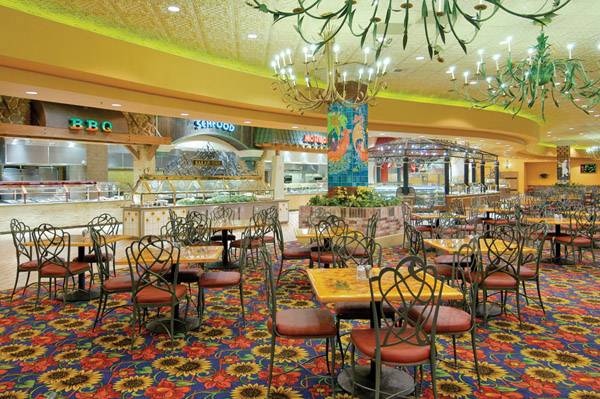
The French Market Buffet inside Boyd Gaming’s Orleans resort. The Nevada Tax Commission ruled Monday that casinos must pay sales tax on comped meals given to gamblers.
Sunday, Aug. 14, 2011 | 2 a.m.
Related Stories
- State: Casinos owe tens of millions for comps (8-10-2011)
- Lawmakers ignore comped-meals tax issue, its $210M implication (5-1-2011)
- Gamers’ prospects looking good on comped-meal tax issue (6-27-2008)
- Governor says he wants to close $150 million loophole (6-27-2008)
- Gaming industry opposes tax provision (6-27-2008)
Last week, the state saw the tip of the proverbial iceberg.
With Nevada government scraping to stay in the black, a recent Tax Department audit concluded Boyd Gaming Corp. owes $20 million in unpaid taxes and interest, according to a company filing with the Securities and Exchange Commission.
The company disagrees. Boyd argues that, in fact, it is the state that owes the company about that amount in taxes it wrongfully paid on comped meals from 2000 to 2008.
At issue is whether casinos should be taxed on the food they give away — whether to employees in their lunchrooms or to gamblers to entice them to linger at the slots and tables.
Because this affects any Nevada casino that offers such comps, Boyd’s situation offers just an inkling of what the industry could owe the state. A similar audit of Caesars Entertainment is confidential, according to the state Tax Department, but the amount large casino companies would owe if the state wins this dispute is much higher than the $20 million the state claims Boyd owes.
Meanwhile, casino companies are trying to reclaim $210 million they say the state wrongfully collected because of shifting legal opinions.
“The stakes for both sides are very high,” said Carole Vilardo, president of the Nevada Taxpayers Association. If casino companies win, the state would have to pay refunds “which would be very difficult in this economy.” But if the state wins, casinos would have to pay a much higher sales tax based on the retail value of the food versus the wholesale value.
The comped-food battle will test the will of Gov. Brian Sandoval and lawmakers to tangle with the state’s most powerful industry. In 2008, gaming lobbyists successfully killed legislation that would have settled the matter.
In Nevada, food is exempt from the sales and use tax unless it is prepared for immediate consumption; you pay sales tax on a sandwich at a restaurant, but not on bread you buy at the store.
For decades, casinos paid a “use tax” on the food, calculated on the company’s cost of preparing the meal. But the Sparks Nugget, also called John Ascuaga’s Nugget, said it shouldn’t pay the tax at all. In 2008, the Nevada Supreme Court handed a victory to the Nugget.
More than 100 casinos figured they should get tax refunds totaling about $210 million. And many casinos, citing the ruling, stopped paying taxes on comped meals.
Gov. Jim Gibbons’ administration, pummeled by deep budget deficits, played hardball. Rather than refund the money, the Taxation Department decided to collect sales tax on the meals, putting forward a new legal argument that the meals are provided to patrons and casino employees as “consideration” — either to encourage gambler loyalty or as part of an employee’s compensation package. That amount is calculated on the full retail price of the meals, a much higher number than the old way of calculating the tax.
It was an argument that the Supreme Court seemed to invite. The court stated in a footnote to its ruling, “we do not foreclose the possibility that complimentary meals such as the ones at issue … may be subject to sales tax where consideration is properly demonstrated.”
Indeed, Administrative Law Judge Dena James Smith has ruled, in a case involving Boyd Gaming, that casinos should pay sales tax on the meals they comp gamblers. “The complimentary meals were directly in exchange for information and a certain amount of gambling,” she wrote. But she ruled that employee meals were not subject to any tax.
The Taxation Department, Boyd and Caesars are appealing the judge’s ruling to the Nevada Tax Commission — the tax man being upset by the ruling and the casinos wanting their refunds.

Join the Discussion:
Check this out for a full explanation of our conversion to the LiveFyre commenting system and instructions on how to sign up for an account.
Full comments policy